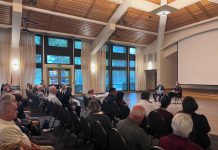“Public commissions, boards, councils and other legislative bodies of local government agencies exist to aid in the conduct of the people’s business. The people do not yield their sovereignty to the bodies that serve them. The people insist on remaining informed to retain control over the legislative bodies they have created.”
~ Preamble to the Ralph M. Brown Act
I’m not sure whether Morgan Hill residents should be comforted or concerned by recent news from Gilroy, but this much is clear: It’s not just Morgan Hill officials who have problems grasping the spirit of the Brown Act, California’s open meetings law.
I can summarize the spirit of the Brown Act in six words: Conduct the people’s business in public.
But in recent months in Morgan Hill, city officials vociferously defended the possibility of taxpayer-funded closed-door community conversation meetings, and the Morgan Hill Unified School District board of trustees corrected a Brown Act violation.
Now, apparently, it’s Gilroy’s turn, as demonstrated by stories that ran in Saturday’s edition of The Times’ sister paper, the Gilroy Dispatch.
First was news of the hidden retirements of Gilroy’s top two cops: Chief Gregg Guisiana and Assistant Chief Lanny Brown.
Guisiana retired on Dec. 1, and Brown retired some time last month. If it seems odd to you that no one noticed that these men retired, it’s because they didn’t stop coming to work. Instead, both were quietly and immediately rehired as hourly contract employees to do the jobs from which they just retired.
This double-dipping scheme means that Guisiana could earn more than $277,000 this year, while Brown could earn more than $247,000, considerable boosts from their $100,000-plus salaries before they retired.
They’re sweet deals for Guisiana and Brown, but apparently a whiff of something sour was noticeable to longtime Gilroy City Administrator Jay Baksa, who approved the deals but did not disclose them to the rest of the Gilroy police department, City Council members or Gilroy residents.
I’d argue that every one of those groups has a right and a need to know.
But Baksa didn’t seem to think so, and I have to wonder why. He didn’t bother to reveal the retirements and subsequent double-dipping until it became apparent that The Dispatch was preparing a story about it.
I’m also stunned by Mayor Al Pinheiro’s reaction to the news: “I don’t know what the big hoopla is.”
That’s easy: The secrecy is the “big hoopla.” If the double-dipping scheme is perfectly legal, quite common and to the city’s benefit – as Baksa claims – then why keep it a secret?
Even if it was just on a consent calendar on a City Council agenda, Gilroy police officers, council members and Gilroy residents should have been informed. Lack of disclosure creates distrust.
Then there’s the Gilroy Unified School District board of trustees. You’d think that after the “hoopla” surrounding apparent Brown Act violations committed by a committee the board appointed to review names for Las Animas School, and after Board President Tom Bundros took a recent Brown Act refresher course, officials would be on their toes concerning open meetings rules.
You’d be wrong.
According to Trustee Rhoda Bress, outgoing GUSD Superintendent Edwin Diaz appointed himself to negotiate district administrators’ salary increase, and updated trustees in closed session about those negotiations.
The Brown Act says that trustees can only meet in closed session with designated negotiators, and the board never designated Diaz.
“It’s a complete departure from the law concerning open meetings,” Brown Act expert Terry Franke told the paper.
Nevertheless, Bundros isn’t convinced that the board violated the Brown Act.
“I’m not sure I’d characterize it as a violation of the Brown Act,” Bundros said.
I’m sure that I would. It clearly violates the spirit of California’s open meetings law.
Taken together, these incidents make it clear that South County residents must insist upon an attitude adjustment from their public officials.
Whether you chalk the problem up to cronyism, arrogance, paternalism, inattention or incompetence, kudos to the local newspapers for doing their job by exposing these violations of the spirit or the letter of the law.
Now, the public must show its righteous indignation and demand that elected officials and administrators conduct their business in public.
Otherwise, it’s too easy for government officials to hide important information, skirt the rules, and protect their own self interests instead of the public’s interests.
“To restore and keep the public’s confidence in the integrity of their government, … government and its officials must be open, honest and transparent.”
~ New Hampshire Governor John Lynch
Lisa Pampuch is a technical editor and a member of the newspaper’s editorial board. She lives in Morgan Hill with her husband and two children. Reach her at li*********@***me.com.







